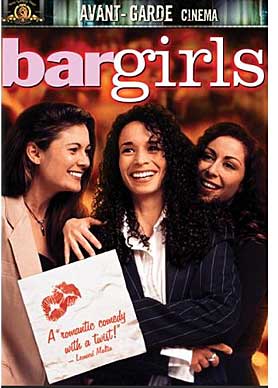
 |
||||||
|
GAY
FILM REVIEWS BY MICHAEL D. KLEMM
|
||||||
|
The Incredibly True Story Of Two Girls In Love 1995 Director/Screenplay: Starring: Laurel Holloman, Nicole Ari Parker, Maggie Moore, Kate Stafford, Sabrina Artel, Toby Poser, Nelson Rodriguez, Dale Dickey Rated R, 94 minutes
Bar
Girls Director:: Screenplay: Starring: Nancy Allison Wolfe, Liza D'Agostino, Camila Griggs, Michael Harris, Justine Slater, Lisa Parker, Pam Raines, Chastity Bono Rated R,, 93 minutes |
Women
Without Men
The Incredibly True Adventure of 2 Girls in Love (1995) begins with a wonderful bit of audience-deception. Two pairs of feet, one wearing high heel shoes, the other sneakers, fill the frame in close-up. The camera moves up, revealing shapely thighs intertwined with baggy jeans. The visual cues suggest a man and a woman in carnal embrace. When the camera reaches their faces... surprise! It's two women! In a gas station restroom no less! This opening shot typifies the offbeat approach taken in writer/director Maria Maggenti's charming independent film which chronicles the love which blossoms between two lesbian teen-agers from opposite sides of the track. Laurel Holloman stars as Randy Dean. Randy wears her hair short, dresses like a tomboy, doodles amazon women in class, and plays the guitar. She lives happily, and unashamed, in the back of a gas station owned by her Aunt Rebecca and her girlfiend Vikki. "Just a normal, typical, regular, lesbo household," Randy tells the audience. The object of her affection is Evie, (Nicole Parker), a charming African American girl who attends the same high school. Evie is a very naive debutante who lives with her doting mother. She is confused for the first time about her sexuality and breaks up with her boyfriend. Randy is dirt poor, Evie has money. Sparks fly between the two girls despite their differences.
The Incredibly True Adventure of 2 Girls in Love succeeds on many levels. It is, first and foremost, a tender and believable story of young love that is lightyears ahead of the usual teen faire. Conflicts rise naturally from the script in ways which make it appear as if the audience is sneaking a peak at the protagonists' actual lives. The absence of any recognizable faces in the film helps to sustain this illusion. Many scenes are wonderfully comic because they run counter to audience expectations. (When is the last time you've seen a drunk man confront a teen-aged lesbian and order her to stay away from his wife in a movie?) The result is a sharp teen comedy with brains, a rarity in American cinema. The acting is terrific by all of the main leads. If Billy's Hollywood Screen Kiss is the ultimate date movie for gay males, The Incredibly True Adventure of 2 Girls in Love fills the same void for lesbians. Highly recommended.
|

Another fine lesbian serio-comedy is Marita Giovanni's Bar Girls (1994). While The Incredibly True Adventure of 2 Girls in Love oozes with charm, Bar Girls is a little more wicked. The script by playwright Laura Hoffman spins the tale of Loretta (Nancy Allison Wolfe), a young and insecure woman who is seeking a meaningful relationship. While hanging out in a lesbian bar, Loretta is smitten by Rachel (Liza D'Agostino) and they go home together. Both women are rebounding from bad relationships and each wants to take it slow. After a few dates, however, they impulsively decide to move in together. Their relationship flourishes until they begin to "over-analyze" things like the true nature of love. ("Don't you love me all of the time?" "Well, most of the time...") Chaos erupts when a butch woman named J.R., an attractive police academy cadet, enters the bar and starts to hit on Rachel. Loretta's jealousy subsequently overwhelms their relationship. Loretta works for a cartoon series on cable which features an apparently lesbian superhero, (named Myrtle!), who wears a cape and a vest and dabbles in marriage counseling. A lot of humor, secondary to the main plot, involves this feminist superhero and Loretta's arguments with both the producers - and her straight partner, Noah - over directions in which she wants to take the character. Noah at first objects to Loretta's desire to allow her superhero to have a period. He finally agrees but says that "PMS is out of the question - she could destroy the city."
While not as polished as The Incredibly True Adventure of 2 Girls in Love, the matter-of-fact and unapologetic portrayal of lesbian life is very refreshing. Not all of the women are nice people, and this also adds to the realism. Seeing the usual Joe-macho swinger re-cast as a woman has a way of turning audience expectations on their collective heads. The initally awkward love which blossoms between Loretta and Rachel is also nicely handled, especially as outside pressures (various ex-girl friends, etc.) threathen to keep them apart. Bar Girls is by no means a great film, but it's a very enjoyable one. It is, for the most part, nicely acted and photographed, and its script is filled with issues that are familiar to anyone who has been in a relationship. Bar Girls is much like many of the local productions we have seen and loved at BUA over the years. Even if the script isn't exactly Eugene O'Neill, it still speaks directly to its target audience and can be enjoyed unashamedly as such.
More
On Laurel Holloman |
|